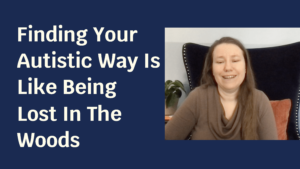
Guilt-Free Rest in Burnout Recovery
How do you rest when your inner critic keeps getting on your case?

How do you rest when your inner critic keeps getting on your case?

The things that drivers do to stay safe and keep others safe, are the same types of things that go on in healthy relationships.

Trying to make your own version of an autistic-friendly life is a bit like finding your way through the deep dark woods.

Once you’ve figured out that you’re masking, and want to do so less, how do you unmask? Here’s my philosophy.

You’ve heard of autistic masking? Here’s an intro on what it is, what it’s not, and some of the side effects.

There are many parts to the internal work that we do to get reasonably comfortable with people. Here are some common ones.

Do you have conflicting thoughts about the idea that self-acceptance can actually work as a way to have better relationships?

Self-acceptance is a nice ideal, but how does it practically get you friends?

Strategies to increase socializing by dealing with the anxiety, or improving social skills, aren’t bad ideas, but they produce limited, short-term results. Here are two reasons why.

A brief, imaginary dip into what “being reasonably comfortable around people” practically looks like.

If your default mode is that people are scary, mean, and tiring, but you still long for good friendships and better relationships, I get that. I’ve been there. And there is hope.

How do you cope with sensory needs when you’re out in public? Here’s a framework and a few tips.